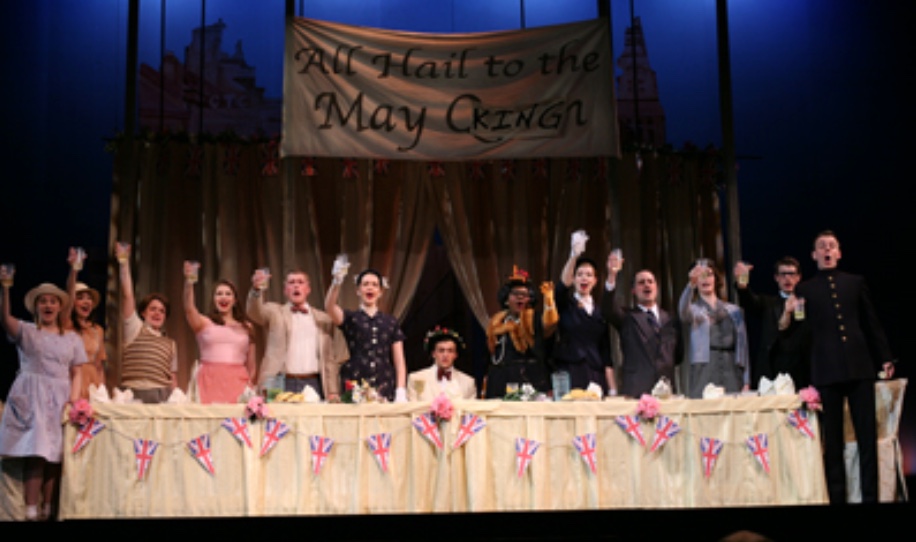by Daniel Hathaway

Populated with stock British characters who might have stepped right out of an Agatha Christie novel, Britten’s three-acter was adapted by librettist Eric Crozier from Madame Husson’s Rosier, a story by Guy de Maupassant, and relocated from France to Suffolk. The opera debuted in 1947 at Glyndebourne in front of audiences who were grateful for some comic relief after the long slog of World War II.
Here’s what happens.
As the curtain rises, the fictional village of Loxford is in a tizzy because none of the candidates for May Queen measure up to the formidable Lady Billow’s exacting moral standards. As a compromise, the village committee decides to switch to a May King and nominates Albert Herring, son of a widowed greengrocer whose apron strings have kept him so tightly bound that he’s oblivious to temptation. All goes well until Sid, the butcher’s assistant, and his girlfriend Nancy contrive to spike Albert’s lemonade at the May banquet. Tipsy and suddenly envious of the exploits of others, Albert uses some of his May King prize money to go on a drinking spree and eventually has the whole village out searching for him. They mourn his death in a threnody when his tattered floral crown turns up. When he finally comes home, unlike the prodigal son, Albert gets an earful rather than a fatted calf from Mum and the villagers.
It’s possible to thoroughly enjoy Albert Herring as “a genteel comedy reflecting the idiosyncrasies of English village life,” but as Andrew Mellor has written in The Guardian in 2013, “Behind the opera’s jolly japes and canny pastiches is one of Britten’s boldest, most socially revolutionary statements: a piece hardwired into the youthful urge to experiment, rebel and break free.”
Mellor continued: “When I first heard Albert Herring as a teenager in the 1990s, against a backdrop of grunge and the cult coming-of-age TV drama My So-Called Life, it hit me like a freight train. Here was an opera that didn’t feel anything like one: nobody dies; nobody dresses up as a member of the opposite sex; nobody so much as hides in a wardrobe. Instead, a confused and shy young man is crowned Queen of the May because no one can vouch for the virginity of any of the village girls. He spends his prize money on a night of alcohol-fuelled debauchery, probably losing said virginity in the process.”
Jonathon Field having now retired, guest director Stephanie Havey is in charge of staging Albert Herring. Her extensive resumé includes a variety of important directing positions, and she’s no stranger to the Oberlin Conservatory of Music, having served as Visiting Instructor of Opera Theater in 2016, and Acting Instructor for the Oberlin Vocal Academy in 2018.
The title for the fall opera had already been decided, she said in a Zoom conversation during fall break, when she was visiting her husband, who sings with San Francisco Opera. The auditioning process included acting and singing excerpts from the show, and the double cast assignments wouldn’t be made until she saw how individuals interacted with one another.
“This show poses some challenges for young performers because of its many eccentric characters,” she said, “and in the opera world, character actors tend to be older. On the other hand, there are a number of characters with whom college students can readily identify.”
Havie believes that Albert Herring is partly autobiographical for Benjamin Britten, who always saw himself as an outsider, and in whose works the loss of innocence is a continuing theme.
When we spoke, Havey was looking forward to beginning tech rehearsals — dreaded by many, but “My favorite part of the process,” she said.
The orchestra always plays an important role in Britten operas, and especially in his chamber works like The Rape of Lucretia, Albert Herring, and The Turn of the Screw, where it nearly serves as a character of its own. In the pit for this production: Michael Sakir, an Oberlin graduate in the class of 2006, who will lead a lean but expressive ensemble that includes a string quintet, single winds (flute doubling on piccolo and alto flute, oboe, clarinet doubling on bass clarinet, bassoon, horn), harp, piano, and a single percussionist with a whole toolkit of effects.
With last night’s token snowfall, winter is fast approaching. What better way to warm the soul than spending a couple of hours in the company of British village eccentrics — without subscribing to BritBox.
Published on ClevelandClassical.com November 1, 2023
Click here for a printable copy of this article



